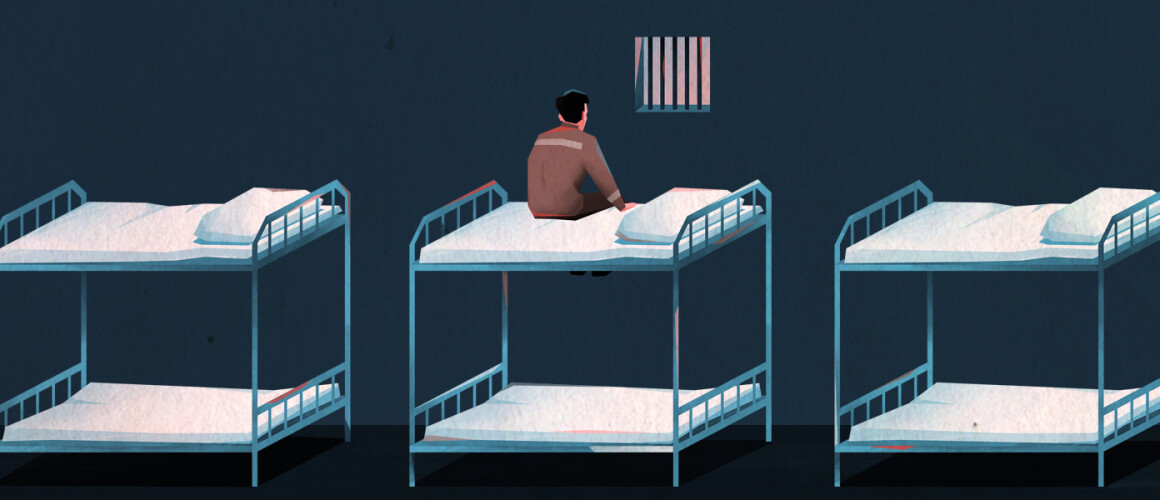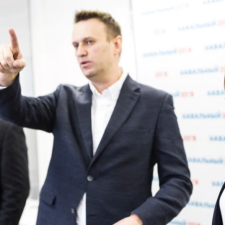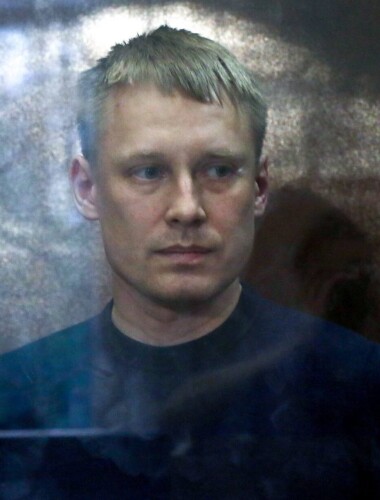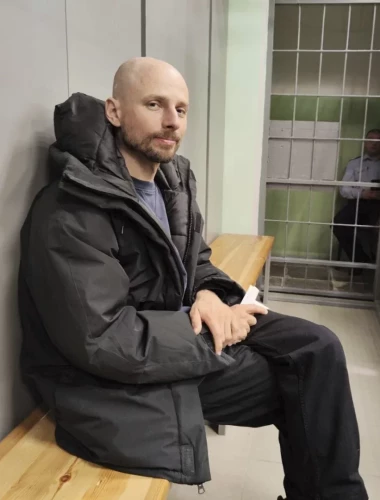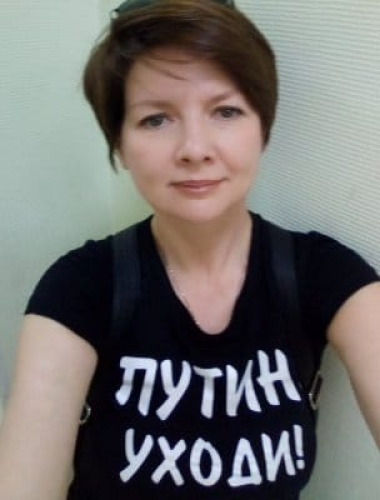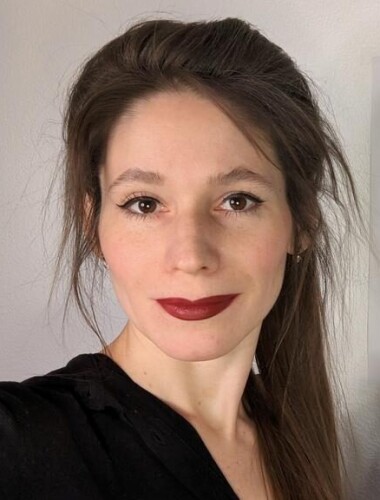Olga Komleva, Antonina Favorskaya (Kravtsova), Konstantin Gabov, and Sergei Karelin are political prisoners
The journalists stand accused of ‘participation in Navalny’s extremist group’ because of their professional work
The ‘Political Prisoners. Memorial’ human rights project, in accordance with international standards, considers Olga Komleva, Antonina Favorskaya (Kravtsova), Konstantin Gabov and Sergei Karelin political prisoners. They are being prosecuted on a charge of ‘participation in an extremist group’ because of their legitimate professional work. The journalists’ prosecutions violate their rights to freely collect and disseminate information and to fair trial. We demand the immediate release of Komleva, Favorskaya, Gabov, and Karelin, an end to their criminal prosecution, and an end to the authorities’ practice of persecuting journalists in Russia.
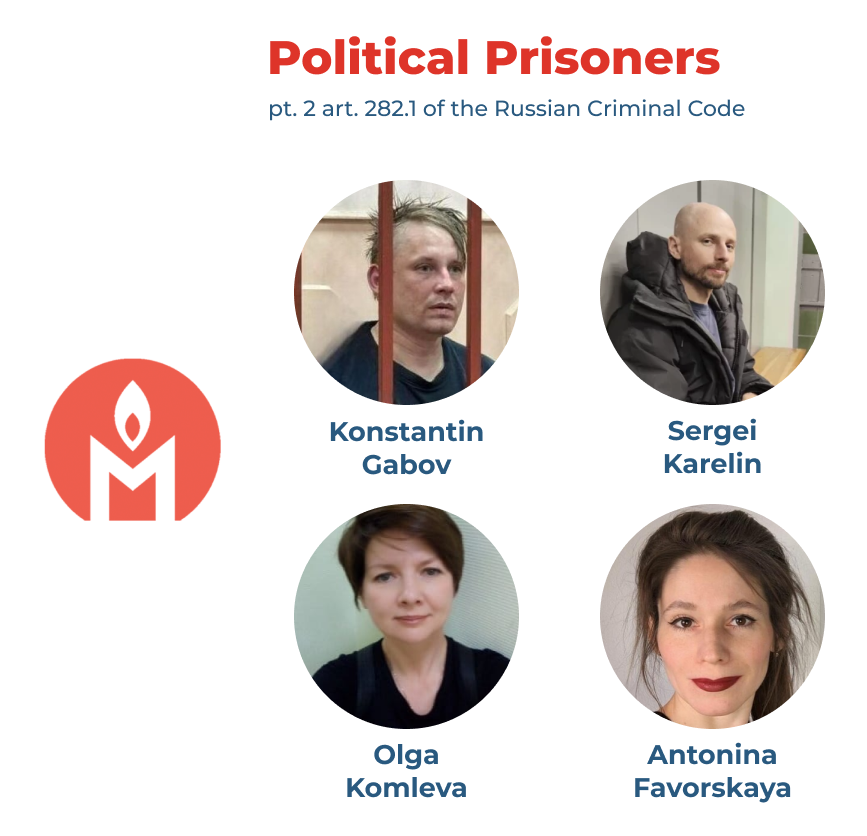
Who are Komleva, Favorskaya, Gabov, and Karelin, and what are the charges against them?
Antonina Favorskaya is a journalist for SOTAvision. She covered the trials of political prisoners, including that of the Russian opposition leader Aleksei Navalny, travelled to the village of Kharp in Russia’s Far North, where Navalny was imprisoned, and reported from a Moscow cemetery during Navalny’s funeral.
Olga Komleva was a volunteer at Navalny’s Headquarters in Ufa before the network was declared an extremist organisation. As a journalist, she worked with RusNews and wrote about the mass protests in the town of Baimak in Bashkortostan.
Konstantin Gabov is a freelance journalist who has worked with Reuters, Deutsche Welle, and Radio Liberty.
Sergei Karelin is a cameraman and journalist who has worked with Associated Press and Deutsche Welle.
Antonina Favorskaya was detained on 17 March 2024 after visiting Navalny’s grave in Moscow. The court jailed her for 10 days for allegedly ‘failing to comply with police instructions.’ On 27 March, she was arrested again at the entrance of the detention centre where she had been held. Several searches were conducted of her home and on 29 March Favorskaya was remanded in custody.
Olga Komleva was detained in Ufa on 27 March. She was also remanded in custody.
On 27 April, it became known that Konstantin Gabov and Sergei Karelin had been detained in Moscow and Murmansk Oblast respectively. They were also remanded in custody.
All four journalists have been charged with participating in an extremist group (Article 282.1, Part 2, of the Russian Criminal Code). If convicted, they face up to six years’ imprisonment. The information about the charges against them is incomplete. Some of them have been charged with preparing photographic and video materials for publication on Aleksei Navalny’s media channels.
Why do we consider the arrested journalists political prisoners?
Our project monitors the criminal cases against Aleksei Navalny, his associates, and his supporters. We are convinced that these prosecutions are related exclusively to the legitimate political activities of the defendants.
Analysis shows that the designation of the political organisations legally created by Navalny and his team as an ‘extremist group’ is in no way justified. There is no evidence of their extremist activities.
The Russian authorities have adopted a vicious practice in the application of Article 282.1 of the Russian Criminal Code by which actions that are unquestionably legal are classified as criminal solely because those accused are declared to be ‘participants in an extremist group.’
The prosecution of journalists who, along with Navalny’s associates and his lawyers, have been charged under the article on the organisation of an extremist group is a vivid example of this practice. Preparation of reports, photographs and videos is the essence of journalistic work. Journalists play a key role in the exercise of the constitutional right to disseminate, seek and receive information. Prosecution of journalists for their work is an attack on democracy and fundamental civic rights.
A detailed description of the prosecution of Navalny’s supporters for participating in an ‘extremist group’ and our position are available on our website.
Recognition of an individual as a political prisoner does not imply the ‘Political Prisoners. Memorial’ human rights project agrees with, or approves, their views, statements, or actions.
How can you help?
You can write to the defendants at the following addresses:
In Russian: 109383, Москва, ул. Шоссейная, д. 92, ФКУ СИЗО-6 УФСИН России по г. Москве
● Комлевой Ольге Юрьевне, 1979 г. р.
● Кравцовой Антонине Юрьевне, 1989 г. р.
125130, Москва, ул. Выборгская, д. 20, ФКУ СИЗО-5 УФСИН России по г. Москве
● Габову Константину Васильевичу, 1986 г. р.
● Карелину Сергею Валентиновичу, 1983 г. р.
In English: Olga Yurievna Komleva (born 1979), Antonina Yurievna Kravtsova (born 1989), Remand Prison No. 6, Federal Penitentiary Service of Russia for the city of Moscow, 92 Shosseinaya Street, Moscow, 109383, Russia.
Konstantin Vasilievich Gabov (born 1986), Sergei Valentinovich Karelin (born 1983), Remand Prison No. 5, Federal Penitentiary Service of Russia for the city of Moscow, 20 Vyborgskaya Street, Moscow, 125130, Russia.
You can send an email via F-Pismo and Zonatelecom (Russian bank cards), PrisonMail (other bank cards), or OVD-Info (free of charge).
Please note that letters in languages other than Russian are highly unlikely to reach the recipient.
You can donate to support all political prisoners in Russia.
